
CONTENTS
2. Important Event: The Cold War
6. Answer Keys
1. IN THE NEWS THIS WEEK

Important note: This is just a sample of news items from this week. Often, more important events have taken place, affecting many more people than the events chosen for this section. The editor hopes to limit news about death and destruction. Since this is an educational resource, we also hope to focus on useful vocabulary.
News item #1: Central Texas floods: The death toll from severe flooding in Central Texas, USA, has risen to 104, with 28 of the victims being children. Another 41 people remain missing. Authorities have issued flash flood warnings due to expected heavy rainfall in the coming days.
Vocabulary exercise
Read the definitions of words and phrases. Then complete each sentence with one of the bold words or phrases.
a. death toll (n.): the number of people who have died in an event such as a disaster or war
b. flooding (n.): when water covers land that is usually dry
c. authorities (n.): people or organizations in charge, like the police or government
d. flash flood (n.): a sudden and dangerous flood, often after heavy rain
e. rainfall (n.): the amount of rain that falls in a certain time or place
1. A ____________ swept through the town in just minutes.
2. This year’s ____________ is much higher than usual.
3. Heavy rain caused severe ____________ in the city.
4. The earthquake had a ____________ of over 200 people.
5. The ____________ warned people to stay indoors during the storm.
(Audio included with the answer key at the end of this lesson)
News item #2: New U.S. tariffs announced: President Trump has introduced new tariff rates on imports from seven countries: Algeria, Brunei, Iraq, Libya, Moldova, the Philippines, and Sri Lanka. The government has assigned country-specific duties ranging from 20% to 30%. This decision follows the expiration of a 90-day negotiation period.
Vocabulary exercise
Read the definitions of words and phrases. Then complete each sentence with one of the bold words or phrases.
a. tariff rates (n.): the taxes placed on goods imported or exported
b. (to) assign (v.): to give someone a task or responsibility
c. duties (n.): taxes paid on imported or exported goods
d. expiration (n.): the end of a set time period
e. negotiation period (n.): the time set aside for discussing and making an agreement
1. The companies are in a 30-day ____________ to reach a deal.
2. They had to pay _________ at the border when bringing in goods.
3. The manager ____________ the new project to her team.
4. The government increased ____________ on foreign cars.
5. The contract is near its ____________ date.
(Audio included with the answer key at the end of this lesson)
News item #3: Turkey restricts AI chatbot: Turkey has partially blocked some responses from X’s AI chatbot, Grok, as part of a criminal probe. The investigation involves alleged insults against Turkish President Recep Tayyip Erdoğan and the nation’s founder, Mustafa Kemal Atatürk.
Vocabulary exercise
Read the definitions of words and phrases. Then complete each sentence with one of the bold words or phrases.
a. partially (adv.): not completely; only in part
b. AI chatbot (n.): a computer program that uses artificial intelligence to talk with people
c. criminal probe (n.): an official investigation into possible criminal activity
d. insult (n.): a rude or offensive remark
e. Mustafa Kemal Atatürk (person): the founder and first president of modern Turkey, known for major reforms
1. Many websites now use an ____________ to help customers.
2. ______________________ helped transform Turkey into a modern, secular nation.
3. He felt hurt by her ____________ during the argument.
4. The road was ____________ blocked by fallen trees.
5. The company is under a ________________ for fraud.
(Audio included with the answer key at the end of this lesson).
2. IMPORTANT EVENT: The Cold War
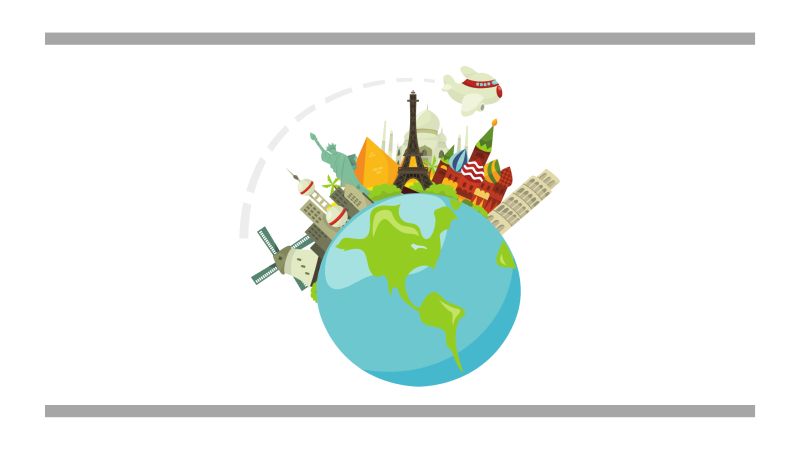
Video
Summary
The Cold War, spanning from the end of World War II in 1945 to the early 1990s, was characterized by political tension and military competition between the United States and the Soviet Union. Despite moments of cooperation, both superpowers built up their military forces, developed nuclear weapons, and engaged in global influence struggles. The Cold War’s impact extended beyond the US and the Soviet Union, shaping alliances, such as NATO and the Warsaw Pact. The era concluded with the collapse of the Soviet Union in 1991, ushering in a new phase of global cooperation.
Facts
- The Cold War occurred from the end of World War II in 1945 to the early 1990s.
- The US and the Soviet Union were the primary global contenders during the Cold War.
- Both superpowers aimed to promote their systems of government and extend their influence globally.
- Military buildup and technological advancements, including nuclear weapons, characterized the Cold War.
- Arms control agreements were negotiated to reduce the threat of nuclear war.
- The competition led to the creation of opposing military alliances: NATO led by the US and the Warsaw Pact led by the Soviet Union.
- The Cold War had a significant impact on global politics, shaping alliances and influencing other nations.
- The Cold War ended with the collapse of the Soviet Union in 1991.
- The conclusion of the Cold War marked a new era of global cooperation and increased stability.
- The legacy of the Cold War continues to influence international relations and the role of powerful nations.
Vocabulary Exercise
Read the definitions of words and phrases. Then complete each sentence with one of the bold words or phrases.
- political tension: unease, rivalry, or strain between political groups or nations
- system of government: the organizational structure and principles by which a country or society is governed
- military forces: the armed personnel and equipment of a nation’s military
- sense of uncertainty: a feeling of doubt, unpredictability, or lack of confidence about the future
- arms control agreements: international agreements that limit the development, production, and deployment of weapons
- threat of nuclear war: the potential danger or risk of a conflict between nations involving the use of nuclear weapons
- military alliance: a formal agreement between nations to support each other militarily in times of conflict
- global stability: the condition of international relations characterized by peace and absence of widespread conflict
- The economic downturn created a _________________________ among the population.
- _________________________ aim to reduce the risk of nuclear conflict between nations.
- Democracy and monarchy are different _________________________.
- Efforts toward diplomacy aim to promote _______________________ and prevent conflicts.
- _______________________ were deployed to secure the border.
- NATO is a _______________________ originally formed for collective defense among member countries.
- The _______________________ between the two countries escalated after the border dispute.
- The Cold War was marked by the constant _________________ __________________ between superpowers.
(Audio included with the answer key at the end of this lesson)
Are you enjoying this lesson? Support us to keep it free for everyone – click on the “Donate” button …
… or go to this page:
https://donorbox.org/english-class-this-week
3. THIS WEEK IN HISTORY
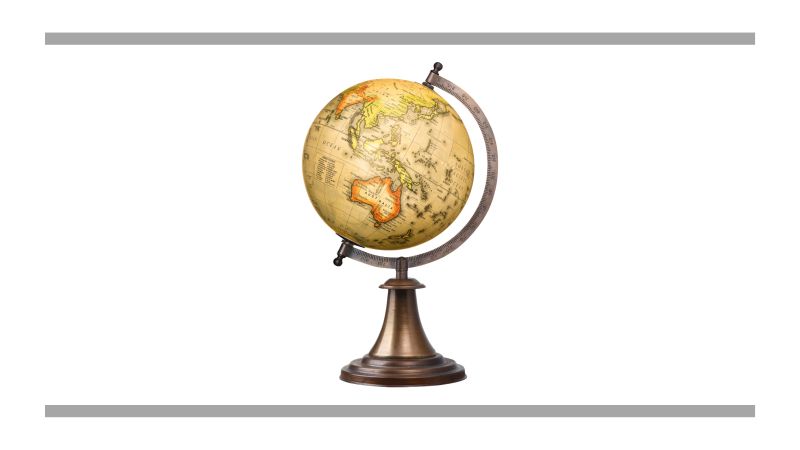
On July 7, 1937, a clash between Japanese and Chinese troops near Beijing, known as the Marco Polo Bridge Incident, sparked the Second Sino-Japanese War. This conflict escalated tensions in Asia, leading to widespread fighting and significant geopolitical changes.
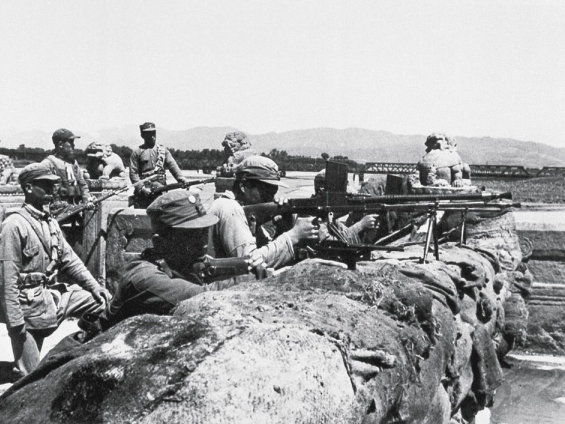
Chinese Army troops fighting Imperial Japanese troops in 1937
Vocabulary exercise
Read the definitions of words and phrases. Then complete each sentence with one of the bold words or phrases.
a. clash (n.): a fight or serious disagreement between people or groups
b. incident (n.): a single event, often unexpected or unpleasant
c. Second Sino-Japanese War (event): a war between China and Japan from 1937 to 1945, mostly fought in China
d. (to) escalate (v.): to increase or become more serious
e. widespread (adj.): happening in many places or affecting many people
f. geopolitical (adj.): related to politics and geography, especially between countries
1. The shooting was a serious ____________ that shocked the city.
2. The conflict had major ____________ consequences for Asia.
3. The _____________________ caused millions of deaths and widescale destruction.
4. There was ____________ damage after the earthquake.
5. The argument ____________ into a physical fight.
6. There was a violent ____________ between protesters and police.
(Audio included with the answer key at the end of this lesson)
On July 8, 1497, Portuguese explorer Vasco da Gama set sail from Lisbon with a fleet of four ships, aiming to find a sea route to India. This event marked a turning point in global trade, opening European exploration and colonialism in Asia.
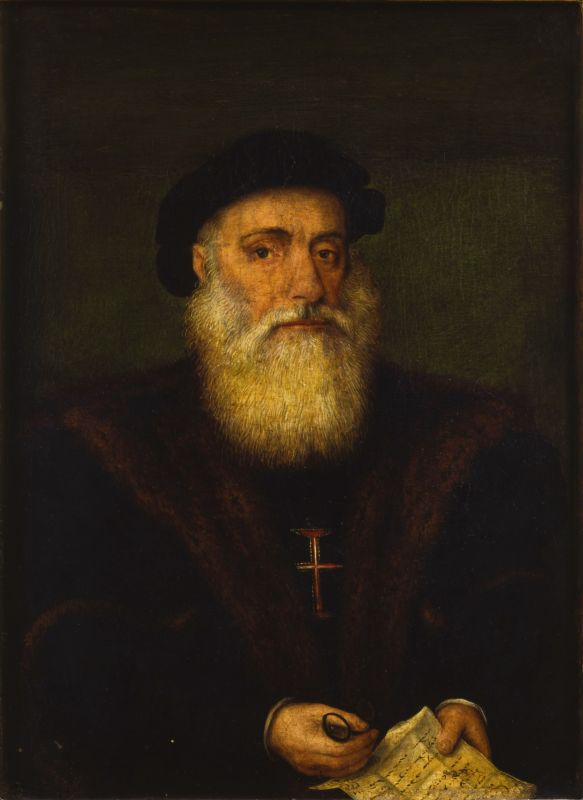
Portrait of Vasco da Gama
Vocabulary exercise
Read the definitions of words and phrases. Then complete each sentence with one of the bold words or phrases.
a. explorer (n.): a person who travels to unknown places to learn more about them
b. Vasco da Gama (person): a Portuguese explorer who was the first European to reach India by sea
c. global trade (adj.+n.): the buying and selling of goods between countries around the world
d. exploration (n.): the act of traveling to discover new lands or information
e. colonialism (n.): a system where one country controls and uses another country or area
1. ____________ often led to conflict and resistance from local people.
2. ____________ increased after European exploration.
3. Space ____________ continues to push human knowledge forward.
4. ________________’s journey opened a new trade route to Asia.
5. The ____________ mapped the new territory for future travelers.
(Audio included with the answer key at the end of this lesson)
On July 9, 1958, a massive earthquake in Alaska triggered a rockslide which caused a megatsunami in Lituya Bay, with waves reaching 525 meters. This natural disaster caused significant destruction and highlighted the power of geological events.
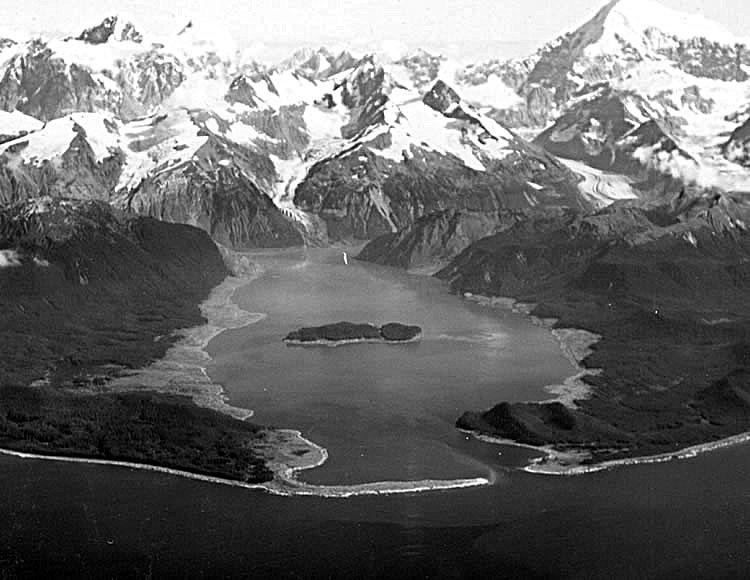
Lituya Bay a few weeks after the 1958 tsunami
Vocabulary exercise
Read the definitions of words and phrases. Then complete each sentence with one of the bold words or phrases.
a. rockslide (n.): a sudden fall of rocks down the side of a mountain or hill
b. megatsunami (n.): a very large and powerful tsunami, often caused by a landslide or impact
c. natural disaster (adj.+n.): a major event caused by nature that causes damage or death
d. destruction (n.): great damage that completely ruins something
e. geological event (adj.+n.): a natural occurrence involving the earth, such as earthquakes or volcanoes
1. The hurricane left behind massive ____________.
2. The flood was the worst ____________ in the region’s history.
3. The hiking trail was closed after a ____________ blocked the path.
4. The earthquake was the most powerful ____________ in decades.
5. A ____________ could destroy entire coastal cities.
(Audio included with the answer key at the end of this lesson)
On July 10, 1962, Telstar, the first communications satellite, was launched, enabling the first live transatlantic television broadcasts. This technological breakthrough revolutionized global communication.
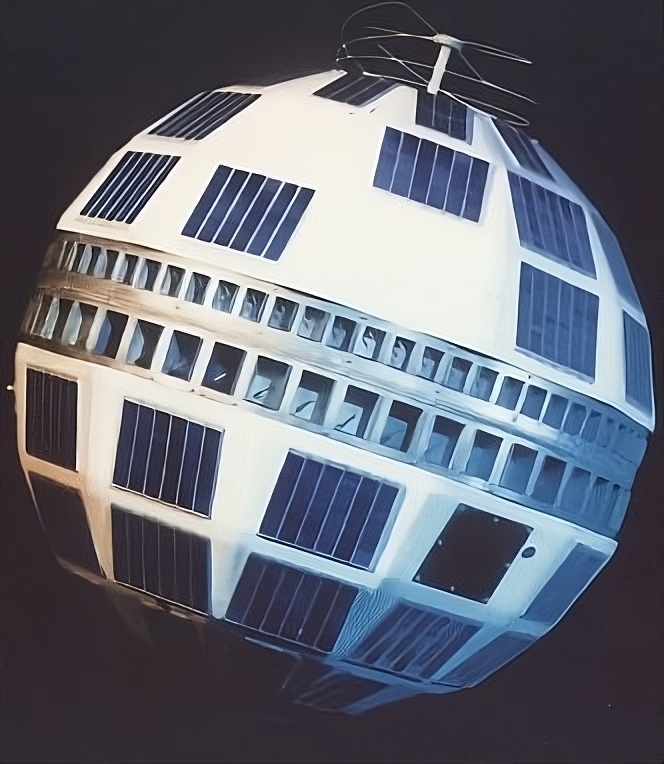
Telstar, the world’s first telecommunications satellite
Vocabulary exercise
Read the definitions of words and phrases. Then complete each sentence with one of the bold words or phrases.
a. communications satellite (n.): a satellite used to send signals for phones, TV, or internet
b. (to) enable (v.): to make something possible
c. transatlantic (adj.): across the Atlantic Ocean
d. television broadcast (n.): a program sent out over the air or by cable to be watched on TV
e. technological breakthrough (n.): a big and important advance in technology
1. The invention of the internet was a major ____________________.
2. The live ____________________ reached millions of homes.
3. The ______________________ allows people to make global phone calls.
4. ______________ flights became popular after World War II.
5. The new software ____________ faster data sharing.
(Audio included with the answer key at the end of this lesson)
On July 11, 1804, U.S. Vice President Aaron Burr fatally shot Alexander Hamilton, a Founding Father, in a duel in Weehawken, New Jersey. This event underscored political rivalries in early American history.
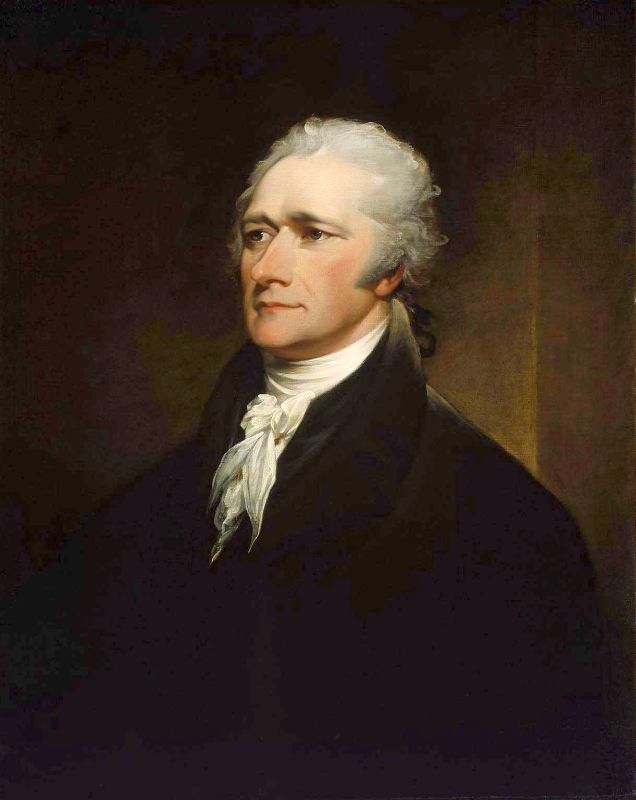
Alexander Hamilton (painting by John Trumbull, 1806)
Vocabulary exercise
Read the definitions of words and phrases. Then complete each sentence with one of the bold words or phrases.
1. Vice President (n.): the second-highest leader in a country or organization, after the president
2. Founding Father (n.): one of the leaders who helped start a country, especially the U.S.
3. duel (n.): a formal fight between two people, often with weapons
4. (to) underscore (v.): to emphasize or show the importance of something
5. political rivalry (adj.+n.): strong competition between politicians or political groups
1. The results ____________ the need for better healthcare.
2. The ____________ divided the nation for years.
3. Thomas Jefferson was a ____________ of the United States.
4. The two rivals settled their argument in a ____________.
5. The ____________ gave a speech on education reform.
(Audio included with the answer key at the end of this lesson)
On July 12, 1943, the Battle of Prokhorovka, one of the largest tank battles in history, occurred during World War II’s Battle of Kursk. Soviet forces clashed with Nazi Germany, marking a decisive moment on the Eastern Front.
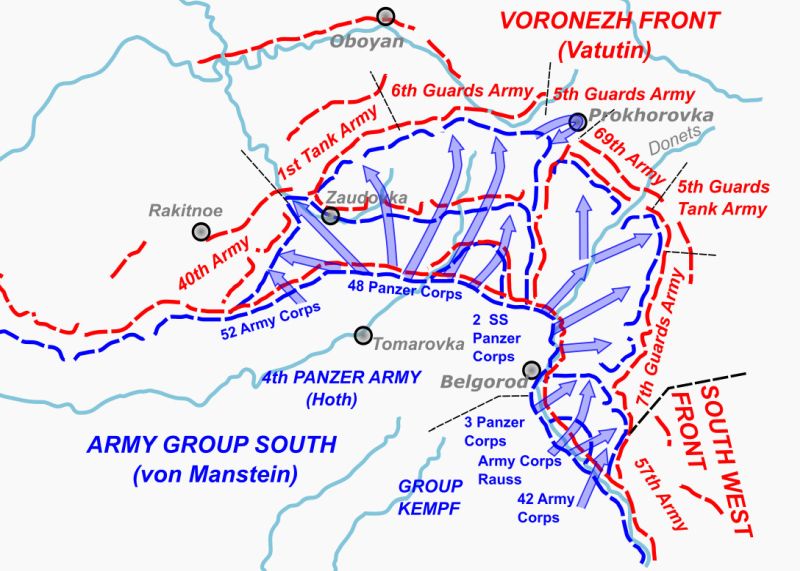
The German offensive at Kursk
Vocabulary exercise
Read the definitions of words and phrases. Then complete each sentence with one of the bold words or phrases.
a. Battle of Kursk (event): a major WWII tank battle between Nazi Germany and the Soviet Union in 1943
b. Soviet forces (adj.+n.): the military troops of the Soviet Union
c. Nazi Germany (place): Germany under Adolf Hitler’s rule from 1933 to 1945
d. decisive moment (adj.+n.): a very important time when the final result is decided
e. Eastern Front (place, WWII): the part of WWII where Germany fought the Soviet Union in Eastern Europe
1. ____________ advanced rapidly after winning the battle.
2. The invasion was a ____________ in the war.
3. Millions died on the ____________ during fierce battles.
4. ____________ invaded many European countries during World War II.
5. The ____________ marked a turning point on the Eastern Front.
(Audio included with the answer key at the end of this lesson)
On July 13, 1977, a massive blackout struck New York City, lasting 25 hours and leading to widespread looting and chaos. This event highlighted urban infrastructure challenges and social tensions.
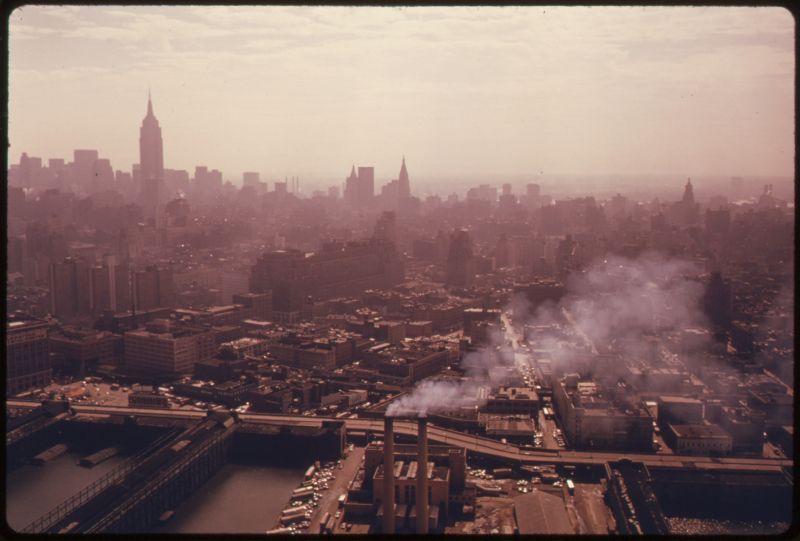
New York in the 1970s
Vocabulary exercise
Read the definitions of words and phrases. Then complete each sentence with one of the bold words or phrases.
a. blackout (n.): a period when electricity is lost in an area
b. looting (n.): the activity of stealing things, often during a war or disaster
c. chaos (n.): complete confusion and disorder
d. urban infrastructure (adj.+n.): the basic systems in a city, like roads, water, and power
e. social tensions (adj.+n.): stress and conflict between groups in society
1. The protest turned into ____________ when violence broke out.
2. High unemployment can lead to ____________.
3. There was ____________ after the hurricane destroyed the shops.
4. The earthquake damaged much of the __________________.
5. We used candles during the ____________ last night.
(Audio included with the answer key at the end of this lesson)
4. GRAMMAR FOCUS

Historical event: On July 13, 1977, a massive blackout struck New York City, lasting 25 hours and leading to widespread looting and chaos. This event highlighted urban infrastructure challenges and social tensions.
PRESENT TENSES
Complete the sentences with the correct form of the verbs
Simple Present Tense: Examples: a) He walks to the shop every day. b) He lives near the shop. c) One plus one equals two.
People in New York often_________ (talk) about the blackout of 1977.
Present Continuous Tense: Example: He is walking to the shop.
Some residents are still_________ (share) stories about what they experienced that night.
Present Perfect Tense: Examples: a) He has walked to the shop many times. b) He has lived near the shop for ten years.
The city ___________ (face) several blackouts, but the one in 1977 was especially chaotic.
Present Perfect Continuous Tense: Examples: a) He has been walking to the shop for more than an hour. b) He has been going to the shop a lot lately.
Engineers ________________ (study) the causes of the 1977 blackout for decades.
(Audio included with the answer key at the end of this lesson)
PAST TENSES
Complete the sentences with the correct form of the verbs
Simple Past Tense: Example: He walked to the shop yesterday afternoon.
The blackout _________ (start) at around 9:30 p.m. and _________ (last) for 25 hours.
Past Continuous Tense: Example: He was walking to the shop when I saw him.
People _________ (watch) TV or _________ (eat) dinner when the lights suddenly went out.
Past Perfect Tense: Example: He had already walked to the shop when I saw him.
By the time the lights came back on, many stores _________ (be, loot), and hundreds _________ (be, arrest).
Past Perfect Continuous Tense: Example: He had been walking to the shop for over an hour when I saw him.
City officials _________ (warn) about infrastructure problems before the blackout happened.
(Audio included with the answer key at the end of this lesson)
FUTURE TENSES
Complete the sentences with the correct form of the verbs
Simple Future Tense: Example: He will walk to the shop this afternoon.
The city _________ (remember) the 1977 blackout as a turning point in its history.
Future Continuous Tense: Example: He will be walking to the shop by the time I go to work.
At this time tomorrow, historians _________ (discuss) the anniversary of the blackout.
Future Perfect Tense: Examples: a) By the time I see him, he will already have walked to the shop. b) By this afternoon, he will already have walked to the shop.
By this Friday, it _________ (be) 48 years since the city went dark.
Future Perfect Continuous Tense: Example: He will have been walking to the shop for an hour by the time you see him.
By next year, New Yorkers _________ (talk) about the 1977 blackout for nearly five decades.
(Audio included with the answer key at the end of this lesson)
CONDITIONALS
Complete the sentences with the correct form of the verbs
Example of a first conditional sentence: If it rains, I will stay at home.
If there _________ (be) another power failure, the city _________ (respond) more quickly than in 1977.
Example of a second conditional sentence: If I won the lottery, I would quit my job.
If power grids _________ (be, update) more often, blackouts _________ (not occur) so frequently.
Example of a third conditional sentence: If I had studied harder, I would have passed the exam.
If the power company _________ (fix) the system earlier, the blackout _________ (could, be, prevent).
(Audio included with the answer key at the end of this lesson)
5. QUOTE OF THE WEEK

“The limits of my language means the limits of my world.” ~ Ludwig Wittgenstein
6. ANSWER KEYS

1. IN THE NEWS THIS WEEK: Vocabulary Exercises
News item #1: Central Texas floods
Read the definitions of words and phrases. Then complete each sentence with one of the bold words or phrases.
a. death toll (n.): the number of people who have died in an event such as a disaster or war
b. flooding (n.): when water covers land that is usually dry
c. authorities (n.): people or organizations in charge, like the police or government
d. flash flood (n.): a sudden and dangerous flood, often after heavy rain
e. rainfall (n.): the amount of rain that falls in a certain time or place
1. A flash flood swept through the town in just minutes.
2. This year’s rainfall is much higher than usual.
3. Heavy rain caused severe flooding in the city.
4. The earthquake had a death toll of over 200 people.
5. The authorities warned people to stay indoors during the storm.
News item #2: New U.S. tariffs announced
Read the definitions of words and phrases. Then complete each sentence with one of the bold words or phrases.
a. tariff rates (n.): the taxes placed on goods imported or exported
b. (to) assign (v.): to give someone a task or responsibility
c. duties (n.): taxes paid on imported or exported goods
d. expiration (n.): the end of a set time period
e. negotiation period (n.): the time set aside for discussing and making an agreement
1. The companies are in a 30-day negotiation period to reach a deal.
2. They had to pay duties at the border when bringing in goods.
3. The manager assigned the new project to her team.
4. The government increased tariff rates on foreign cars.
5. The contract is near its expiration date.
News item #3: Turkey restricts AI chatbot
Read the definitions of words and phrases. Then complete each sentence with one of the bold words or phrases.
a. partially (adv.): not completely; only in part
b. AI chatbot (n.): a computer program that uses artificial intelligence to talk with people
c. criminal probe (n.): an official investigation into possible criminal activity
d. insult (n.): a rude or offensive remark
e. Mustafa Kemal Atatürk (person): the founder and first president of modern Turkey, known for major reforms
1. Many websites now use an AI chatbot to help customers.
2. Mustafa Kemal Atatürk helped transform Turkey into a modern, secular nation.
3. He felt hurt by her insult during the argument.
4. The road was partially blocked by fallen trees.
5. The company is under a criminal probe for fraud.
2. IMPORTANT EVENT: THE COLD WAR: Vocabulary Exercise
Read the definitions of words and phrases. Then complete each sentence with one of the bold words or phrases.
- political tension: unease, rivalry, or strain between political groups or nations
- system of government: the organizational structure and principles by which a country or society is governed
- military forces: the armed personnel and equipment of a nation’s military
- sense of uncertainty: a feeling of doubt, unpredictability, or lack of confidence about the future
- arms control agreements: international agreements that limit the development, production, and deployment of weapons
- threat of nuclear war: the potential danger or risk of a conflict between nations involving the use of nuclear weapons
- military alliance: a formal agreement between nations to support each other militarily in times of conflict
- global stability: the condition of international relations characterized by peace and absence of widespread conflict
- The economic downturn created a sense of uncertainty among the population.
- Arms control agreements aim to reduce the risk of nuclear conflict between nations.
- Democracy and monarchy are different systems of government.
- Efforts toward diplomacy aim to promote global stability and prevent conflicts.
- Military forces were deployed to secure the border.
- NATO is a military alliance originally formed for collective defense among member countries.
- The political tension between the two countries escalated after the border dispute.
- The Cold War was marked by the constant threat of nuclear war between superpowers.
3. THIS WEEK IN HISTORY: Vocabulary Exercises
Historical event #1: Marco Polo Bridge Incident
Read the definitions of words and phrases. Then complete each sentence with one of the bold words or phrases.
a. clash (n.): a fight or serious disagreement between people or groups
b. incident (n.): a single event, often unexpected or unpleasant
c. Second Sino-Japanese War (event): a war between China and Japan from 1937 to 1945, mostly fought in China
d. (to) escalate (v.): to increase or become more serious
e. widespread (adj.): happening in many places or affecting many people
f. geopolitical (adj.): related to politics and geography, especially between countries
1. The shooting was a serious incident that shocked the city.
2. The conflict had major geopolitical consequences for Asia.
3. The Second Sino-Japanese War caused millions of deaths and widescale destruction.
4. There was widespread damage after the earthquake.
5. The argument escalated into a physical fight.
6. There was a violent clash between protesters and police.
Historical event #2: Vasco da Gama
Read the definitions of words and phrases. Then complete each sentence with one of the bold words or phrases.
a. explorer (n.): a person who travels to unknown places to learn more about them
b. Vasco da Gama (person): a Portuguese explorer who was the first European to reach India by sea
c. global trade (adj.+n.): the buying and selling of goods between countries around the world
d. exploration (n.): the act of traveling to discover new lands or information
e. colonialism (n.): a system where one country controls and uses another country or area
1. Colonialism often led to conflict and resistance from local people.
2. Global trade increased after European exploration.
3. Space exploration continues to push human knowledge forward.
4. Vasco da Gama’s journey opened a new trade route to Asia.
5. The explorer mapped the new territory for future travelers.
Historical event #3: Megatsunami in Lituya Bay
Read the definitions of words and phrases. Then complete each sentence with one of the bold words or phrases.
a. rockslide (n.): a sudden fall of rocks down the side of a mountain or hill
b. megatsunami (n.): a very large and powerful tsunami, often caused by a landslide or impact
c. natural disaster (adj.+n.): a major event caused by nature that causes damage or death
d. destruction (n.): great damage that completely ruins something
e. geological event (adj.+n.): a natural occurrence involving the earth, such as earthquakes or volcanoes
1. The hurricane left behind massive destruction.
2. The flood was the worst natural disaster in the region’s history.
3. The hiking trail was closed after a rockslide blocked the path.
4. The earthquake was the most powerful geological event in decades.
5. A megatsunami could destroy entire coastal cities.
Historical event #4: Telstar
Read the definitions of words and phrases. Then complete each sentence with one of the bold words or phrases.
a. communications satellite (n.): a satellite used to send signals for phones, TV, or internet
b. (to) enable (v.): to make something possible
c. transatlantic (adj.): across the Atlantic Ocean
d. television broadcast (n.): a program sent out over the air or by cable to be watched on TV
e. technological breakthrough (n.): a big and important advance in technology
1. The invention of the internet was a major technological breakthrough.
2. The live television broadcast reached millions of homes.
3. The communications satellite allows people to make global phone calls.
4. Transatlantic flights became popular after World War II.
5. The new software enables faster data sharing.
Historical event #5: Alexander Hamilton duel
Read the definitions of words and phrases. Then complete each sentence with one of the bold words or phrases.
1. Vice President (n.): the second-highest leader in a country or organization, after the president
2. Founding Father (n.): one of the leaders who helped start a country, especially the U.S.
3. duel (n.): a formal fight between two people, often with weapons
4. (to) underscore (v.): to emphasize or show the importance of something
5. political rivalry (adj.+n.): strong competition between politicians or political groups
1. The results underscore the need for better healthcare.
2. The political rivalry divided the nation for years.
3. Thomas Jefferson was a Founding Father of the United States.
4. The two rivals settled their argument in a duel.
5. The Vice President gave a speech on education reform.
Historical event #6: Battle of Prokhorovka
Read the definitions of words and phrases. Then complete each sentence with one of the bold words or phrases.
a. Battle of Kursk (event): a major WWII tank battle between Nazi Germany and the Soviet Union in 1943
b. Soviet forces (adj.+n.): the military troops of the Soviet Union
c. Nazi Germany (place): Germany under Adolf Hitler’s rule from 1933 to 1945
d. decisive moment (adj.+n.): a very important time when the final result is decided
e. Eastern Front (place, WWII): the part of WWII where Germany fought the Soviet Union in Eastern Europe
1. Soviet forces advanced rapidly after winning the battle.
2. The invasion was a decisive moment in the war.
3. Millions died on the Eastern Front during fierce battles.
4. Nazi Germany invaded many European countries during World War II.
5. The Battle of Kursk marked a turning point on the Eastern Front.
Historical event #7: 1977 New York City blackout
Read the definitions of words and phrases. Then complete each sentence with one of the bold words or phrases.
a. blackout (n.): a period when electricity is lost in an area
b. looting (n.): the activity of stealing things, often during a war or disaster
c. chaos (n.): complete confusion and disorder
d. urban infrastructure (adj.+n.): the basic systems in a city, like roads, water, and power
e. social tensions (adj.+n.): stress and conflict between groups in society
1. The protest turned into chaos when violence broke out.
2. High unemployment can lead to social tensions.
3. There was looting after the hurricane destroyed the shops.
4. The earthquake damaged much of the urban infrastructure.
5. We used candles during the blackout last night.
4. GRAMMAR FOCUS: Vocabulary Exercises
Simple Present Tense: People in New York often talk about the blackout of 1977.
Present Continuous Tense: Some residents are still sharing stories about what they experienced that night.
Present Perfect Tense: The city has faced several blackouts, but the one in 1977 was especially chaotic.
Present Perfect Continuous Tense: Engineers have been studying the causes of the 1977 blackout for decades.
Simple Past Tense: The blackout started at around 9:30 p.m. and lasted for 25 hours.
Past Continuous Tense: People were watching TV or eating dinner when the lights suddenly went out.
Past Perfect Tense: By the time the lights came back on, many stores had been looted, and hundreds had been arrested.
Past Perfect Continuous Tense: City officials had been warning about infrastructure problems before the blackout happened.
Simple Future Tense: The city will remember the 1977 blackout as a turning point in its history.
Future Continuous Tense: At this time tomorrow, historians will be discussing the anniversary of the blackout.
Future Perfect Tense: By this Friday, it will have been 48 years since the city went dark.
Future Perfect Continuous Tense: By next year, New Yorkers will have been talking about the 1977 blackout for nearly five decades.
First conditional: If there is another power failure, the city will respond more quickly than in 1977.
Second conditional: If power grids were updated more often, blackouts would not occur so frequently.
Third conditional: If the power company had fixed the system earlier, the blackout could have been prevented.
That’s it for English class this week! See you next Friday!
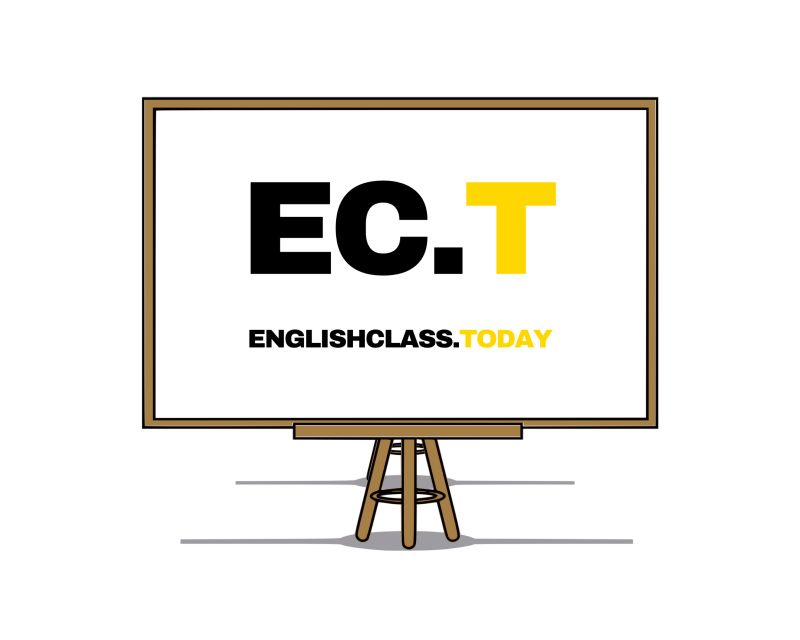
Did you enjoy this lesson? Support us to keep it free for everyone – click on the “Donate” button …
… or go to this page:
https://donorbox.org/english-class-this-week
 Donate
Donate